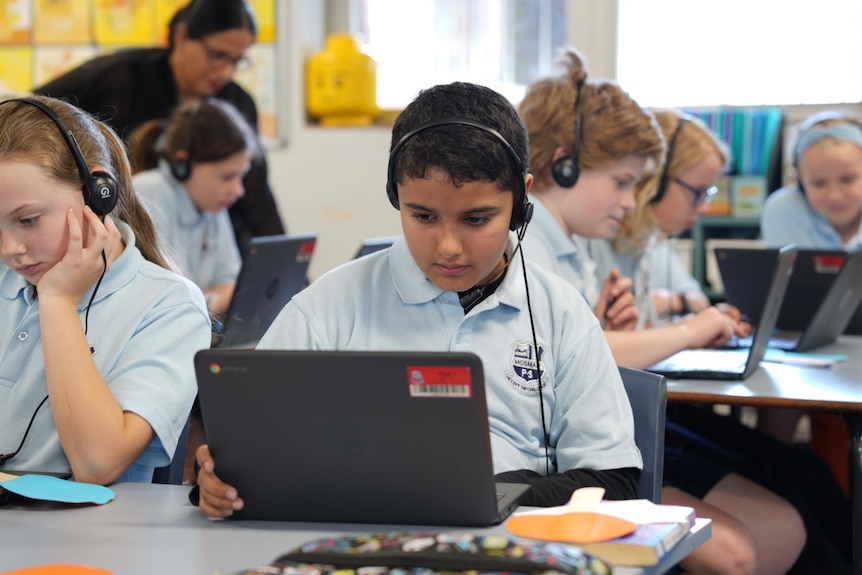In this Sydney classroom, year 5 students are playing a video game.
With headsets on, they watch their screens intently.
It isn’t the typical lesson taught in a primary school, but this game is different.
Using real-life scams, the students are being shown how to spot online fraud.

Students at Mosman Public School playing a video game that teaches them about cyber safety. (ABC News: Ursula Malone)
The game called Dodgy or Not? is updated in real time as scammers find new ways to trick or blackmail victims into parting with their money.
“So what we do is we take scams from the dark web and we put them in the game,” cyber safety educator Stacey Edmonds said.
“We keep abreast of everything new, everything that’s coming and then we pop them in the game.”
Students are presented with a series of messages or social media posts and are then asked to vote on whether they seem genuine or not.
Ms Edmonds designed the game with the help of a group of year 5 students at Mosman Public School.
“Whether it’s on socials, emails, text, or virtual reality, wherever that attempt to scam or contact a young person happens, we want to see that they are critically thinking and asking one question; is it dodgy or not?”

Stacey Edmonds said it’s crucial to teach the next generations how best to spot a deepfake. (ABC News: ABC News: Richard Malone)
Online fraudsters are becoming increasingly sophisticated and are using tools such as generative artificial intelligence to create deepfake images and videos that can be hard to tell from their genuine counterparts.
“We’re looking at scams every day and sometimes I go ‘Oh, this is pretty good. I’m going to have to do more research on this,'” Ms Edmonds noted.
She said it’s making it easier for cyber criminals to fool people online.
“In Australia, we’re losing $3 to $4 billion a year and those are the people who’ve reported it.”
Can you spot a master manipulator?
Try your hand at the quiz, or if you have kids in your life, see if they can also spot the red flags for scams.
Loading
For the students who have played the game, they are in turn learning about potential hazards in the online world.
“It’s good to be aware of it because we’re growing up with more AI and technology,” 10-year-old Ruvimbo said.
Some in the class have family members who’ve fallen victim to online fraud.
“My grandpa once got scammed out of like $1,000 because he doesn’t know really much about technology,” Jack, 10, said.

Cyber safety education has become a core focus. (ABC News: Ursula Malone)
Students told to question everything
Ms Edmonds demonstrated how a deepfake video featuring an ABC journalist can be created in a matter of minutes.
“This is a new thing — people aren’t used to trusted brands being so easy to impersonate.”

Stacey Edmonds showed ABC reporter Ursula Malone how she can make a deepfake video in the space of a few minutes. (ABC News: Richard Malone)
Mona Sidhu, cyber awareness and education manager for the NSW Department of Education, said it was important for young people to learn to question everything they see online and to listen to their gut feeling when something doesn’t seem quite right.
“For these students, friendships are online, relationships are online, shopping is online, banking is online and that’s where criminals are,” she said.

Mona Sidhu said some students have already become victims of scams. (ABC News: Ursula Malone)
Ms Sidhu said there were cases where students had been tricked into sending compromising photographs or blackmailed over deepfake pornographic images.
“Sextortion is coming in a big way for our students,” she said.
“It is [already] happening. It’s worse around the world than in Australia at the moment but it is going to come and hit us in a big way.”
‘Repeatedly targeted’
Ms Edmonds said scammers were creative when it comes to searching out our weak points.
And with online fraud, it’s rarely a case of once bitten, twice shy.
“If you’ve already been scammed, it means you are prone to that social engineering, so you’re more likely to get scammed again,” she said.
“So often, people are repeatedly targeted.”

Australia loses three to four billion dollars a year to cybercrime. (ABC News: Ursula Malone)
As digital natives, these students have already learned hard lessons about navigating online hazards.
They are keen to share these experiences with older generations.
“Kids our age, they know more about the internet and all the online stuff whilst older people might not have the same amount of knowledge of the internet,” 11-year-old Ethan said.











